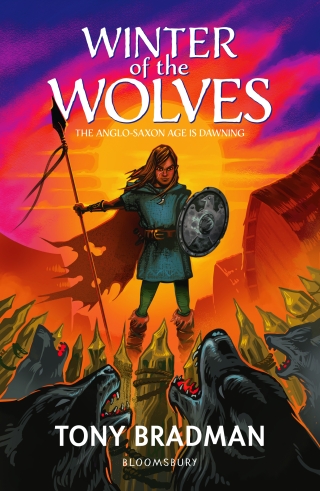Whenever I write a new story, I often seem to reach a point where inspiration dries up and I get stuck. It’s almost as if a voice in my head says over and over again, ‘Why are you writing this rubbish? And what makes you think you’re any good at writing stories anyway?’ I like to think it’s an essential part of the creative process, the temporary triumph of the self-doubt that surrounds any attempt to create something. Get through this, I tell myself, and everything will be fine. But that doesn’t always make it any easier to deal with.
The dreaded moment came early with Winter of the Wolves, my latest Flashback. I had already written two Flashbacks – Revolt Against the Romans, the story of Caractacus’s rebellion in first-century Roman Britain, and Attack of the Vikings, a tale of action and adventure set in the west of Scotland in the Viking Age. I also had a good idea for the new book. It was going to be about the Anglo-Saxon settlement of Britain, seen through the eyes of a young boy, an orphan who is taken in by a chief of the Angles. I was keen to make the Beowulf story part of the plot too. I’m a huge fan of the poem, and I wanted to come up with a suggestion for how it might have been brought to these shores.
As usual I did plenty of research and came up with an outline. I wrote a decent chapter one, moved on to chapter two… and then found myself grinding to a halt. The words stopped coming, the characters wouldn’t speak or do anything interesting, the story refused to come to life. But I didn’t panic. I’d been in the same position many times before, and so I tried the things that have helped in the past – taking a break, reading my notes again, thinking about the characters from a different angle. Doing more research also sometimes helps – it might be that I haven’t immersed myself in the period enough.
That’s what did the trick this time. With Beowulf in mind, I looked up lots of other Anglo-Saxon poetry, and came across a poem I’d forgotten about. In The Traveller’s Song we meet Widsith, an Anglo-Saxon poet of the sixth century, and he tells us of all the royal courts he’s visited, and the important kings and chiefs and warriors he has impressed with his poems and songs. Widsith is a great character – he’s vain and boastful, and the poem reads like a glorious promotional leaflet aimed at getting him more work. At any rate, it really spoke to me across the centuries, perhaps because I’m a freelance writer too. I’ve certainly met a few writers like Widsith, and I have a feeling he never got stuck.
So I put Widsith into my story as an old blind scop – that’s the Anglo-Saxon word for a poet – who becomes a friend and mentor to my central character, Oslaf. Poets were greatly respected in early Anglo-Saxon culture, as praise-singers for warrior chiefs, but also as guardians of the tribe’s history. Widsith quickly became a very important figure in Oslaf’s story, and to a large extent the plot only works because of him. While I was writing the story I kind of felt that Widsith was looking after me too. It was almost as if I had a co-writer I could turn to – ‘What do you think of this bit, Widsith?’ I put a quote from his poem at the beginning of the book, but really his name should be on the title page as well.
The rest of the story came fairly easily after that, although for me that means inching ahead at a rate of about 500 words a day. But you get a feel for how well a story is  progressing, and I knew this one was going to be all right. I’m not usually boastful about what I do, but I’ve decided to emulate Widsith and say that I think Winter of the Wolves is one of the best stories I’ve written. I certainly enjoyed writing it enormously, and I think the cover (by Illustrator Rob Ball) is brilliant. If you want to find out more about Widsith there’s an excellent Wikipedia article about his poem. I’m thinking of starting a Widsith Fan Club – after all, I really do owe him a favour!
progressing, and I knew this one was going to be all right. I’m not usually boastful about what I do, but I’ve decided to emulate Widsith and say that I think Winter of the Wolves is one of the best stories I’ve written. I certainly enjoyed writing it enormously, and I think the cover (by Illustrator Rob Ball) is brilliant. If you want to find out more about Widsith there’s an excellent Wikipedia article about his poem. I’m thinking of starting a Widsith Fan Club – after all, I really do owe him a favour!
Tony Bradman is an award-winning author who has been involved in children’s books for 35 years. His latest novel, Winter of the Wolves, is out now!